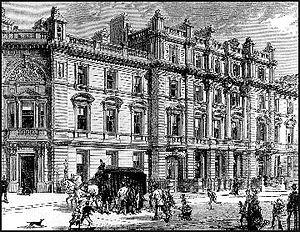
- Image via Wikipedia
After reading Tim Queeny’s recent post on the 18th century MOHOCKS gang I was inspired to write a complementary post on the origination of the Bow Street Runners.
London of the 18th century was already one of the largest cities in the world. By 1750 the population exceeded 700,000. The metropolis was rife with thievery, prostitution and violent crime yet amazingly had virtually no effective system of law enforcement!
The system of crime prevention and law enforcement in place had evolved little from the Medieval times when JPs or Justices of the Peace were appointed by the Crown and assisted by Constables who only worked part-time for meager pay.

Watchmen, originally called Charleys after King Charles II who introduced them, were employed to patrol the streets between dusk and dawn, taking any offenders to the round-houses in each parish. But many were dishonest, lazy or corrupt – spending more time playing cards, habiting pubs, consorting with prostitutes or sleeping! Many also took bribes from criminals. If a watchman had to commit someone to the round-house, a constable would be called to assess the offender and confirm the decision.
Another class of law enforcer was the thief-taker who operated much like a modern day bounty hunter, by accepting a fee for service from the victim to track down the perpetrator of a crime. In some cases, such as with the infamous Jonathan Wild, the thief-taker was a worse offender than those they pursued.
The JP’s oversaw each district and were often familiar with the worst criminals and trouble makers yet the system was terribly corrupted by favours to the powerful and bribes from the wealthy. The Justices tried minor offences punishable by whippings, fines, pillories and so forth and could choose to turn a blind eye to any offender. If a case was too grave for them to handle it would be referred to the Old Bailey.
In 1740 Sir Thomas de Veil, established a court house in Bow Street near the Opera House in Covent Garden. Nearly a decade later author and playwright Henry Fielding was appointed chief magistrate for Westminster. Fielding was a writer and a gentleman with substantial influence in Parliament. It was he who first managed to establish a government fund designated for law enforcement and formed the Bow Street Runners, London’s first band of constables. He also set up a horse patrol and a magazine called the Covent Garden Journal to inform people of recent crimes and wanted criminals.
In 1751, he published a report about the rise in crime. The Inquiry into the Causes of the Late Increase of Robbers broke down the problems:
- too many people coming to London expecting an easy life
- corruption in the government
- people were choosing crime rather than hard work
- the constables were mostly useless – only 6 out of 80 were worth keeping on.
Initially nicknamed Robin Redbreasts due to their scarlet waistcoats, Fielding’s eight original Runners conducted detective work, served writs and arrested offenders. Outwardly, they were a cross between a barrister’s clerk and thief-taker and worked out of No. 4 Bow Street. The Runners were native Londoners with intimate knowledge of the people, the ghettos, the pubs and brothels. They were a tough bunch and effective in solving and suppressing crime. Under Fielding’s influence, they quickly gained a reputation for honesty and efficiency.
By 1754 when Henry Fielding’s health began to fail, his position was given to his blind half-brother John Fielding, who was reputed to be able to recognize the voices of over 3,000 criminals and could distinguish a liar simply by the pitch of their voice. He remained Chief Magistrate for 26 years until 1780.
In 2008 The BBC broadcast a Georgian era television series featuring the Fielding brothers and the original Bow Street Runners. Although they took considerable license in some areas, I highly recommend it.
CITY OF VICE TRAILER
REFERENCES
http://englishhistoryauthors.blogspot.com/2011/11/mohocks-terrorize-georgian-london-by.html
http://www.georgianlondon.com/early-policing-and-the-bow-street-runners
http://www.learnhistory.org.uk/cpp/bow.htm
http://en.wikipedia.org/wiki/City_of_Vice


